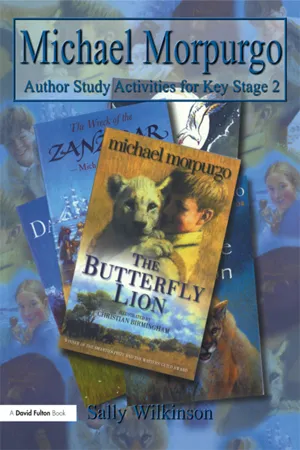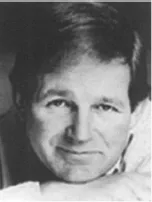![]()
1 Biographical information
Michael Morpurgo is an author who is worth getting to know well. The more you find out about his life and interests, the more you see how these are echoed in his books. He would not say that he writes books; he writes stories that are about children – not for children. First, they have to fascinate him, or he would not be able to write them, both him as an adult and the child within him. He says that ‘researching a book is me being a child. I want to know’. He hopes that his stories help children open their eyes against complacency and prejudice.
A man of the country
Michael Morpurgo was born in 1943. He has now written over 60 books and many of these draw on his passion for the countryside, animals and farming. His interest in farming also led to him and his wife, Clare, founding the charity ‘Farms for City Children’. They now run three farms in Devon, Pembrokeshire and most recently in Gloucestershire. Sam’s Duck is dedicated to one of them, Nethercott, where the story is also set. The farms give 3,000 children a year who live in urban areas the chance to stay on a farm and contribute to its daily life by helping with jobs like feeding the animals, tending the crops and mucking out stables. Iddesleigh, the village in Devon where Nethercott Farm is situated, appears in several of Michael’s books. Nethercott Farm is the setting in Farm Boy and War Horse, with both books being dedicated to the people of the village.
Michael Morpurgo’s favourite holiday haunts also appear in his stories. He and his family have spent many happy times on the Scilly Isles, which are now the setting for three of his books. Here they enjoy walking and sailing. One of his sons is a keen birdwatcher, and Why the Whales Came originated while on holiday with him on the Scilly Isles. The idea for the deserted island of Samson that is at the heart of the story came from a true local tale. Another favourite haunt is the island of Bryher, the setting for The Wreck of the Zanzibar. The name of the ship came from a family story that his mother loved to tell. Apparently when Michael was three she found him rocking on his bed, chanting ‘Zanzibar, Marzipan, Zanzibar’ over and over for no particular reason.
His childhood
Michael Morpurgo draws on other childhood memories in his stories. As a child he lived in London, except for a short period during the war when the family was evacuated to the countryside. After London they moved to Bradwell-on-Sea in Essex, a setting which features in Escape from Shangri-La as the childhood home of Cessie’s dad. From here he went to boarding school, first a prep. school in Sussex and then King’s School in Canterbury. At the former he often suffered from homesickness, like Albert in Butterfly Lion, and he didn’t feel that he was very academically minded. He didn’t enjoy English lessons, particularly writing, and although there were some authors whom he would read avidly, he wasn’t a bookworm – this came later on. Once at Canterbury he found his niche as an important member of the school rugby and cricket teams and developed his love of music.
Choosing a career
After a brief spell training in the army at Sandhurst, Michael Morpurgo realised that army life was not for him. He married Clare and after completing a degree in English Literature became a teacher, first of secondary age children and then in a primary school. The children he taught were the first to hear his work. At this time these were mostly short stories and Michael realised that he could do something powerful with the written word as he captured his children’s attention with the stories that he had written. After eight years of teaching both Michael and Clare wanted to continue working with children, but to do so in a different context that would enable them to have more of an impact on children’s lives and change their perceptions of the world. Through a family inheritance they were able to set up the first of their ‘Farms for City Children’ at Nethercott. This special farm, where children from towns and cities can be the farmers, has provided first-hand experience of the countryside and the opportunity to work together. From here on, Morpurgo combined writing with working on the farm.
His writing
One crucial aspect of the writing process that Michael Morpurgo emphasises is that it is important to dream. This way, he says, the story grows inside you over time. He mulls over ideas for plots, characters and settings in his head when he’s working on the farm or even on holiday. Most of the major books he’s written have taken him about a year. Only when he feels the story is ready will he write it down. His favourite place to write is on his bed, often with his dog beside him. He doesn’t like to redraft his work, so he tries to get it right first time, filling the pages with as much writing as possible so that he doesn’t have to begin a blank page (another thing he dislikes doing). He has many more ideas than ever make it into print and finds that sometimes working on one idea can lead to an even better one that he wasn’t expecting. Once the book is written, Morpurgo likes to share his dream with the children who are staying on the farm. His wife also reads all his first drafts as he values her opinions.
Other aspects of Michael Morpurgo’s life that are reflected in his stories come from incidents that have happened to him or that he has witnessed, and influences in his own life. He did not get to know his father until he was in his twenties as his parents separated when he was very young. He had a good relationship with his stepfather and was also very attached to his grandparents. There is a very good account of how he and his brother came to meet their father in the autobiographical short story ‘My Father is a Polar Bear’ in the collection Hereabout Hill. The title of the story comes from a picture Michael had as a child of his father playing the character of a polar bear in a play. He and his brother actually got to see him acting in it, but it was not until many years later that he met him when he returned to England from his home in Canada to act in another play.
The theme of relationships between the old and the young has been one which Michael has explored in many of his books, and that comes from his experiences as a child, but also more recently as a grandfather himself. He captures well the close bond of trust and understanding that can exist between the old and the young. (See ‘Relationships with grandparents and older people’, p. 37.)
Michael Morpurgo has carried out extensive research for many of his books. His interest in the First World War appears in several stories and was developed through detailed detective work involving long hours reading, visiting the Imperial War Museum and also through talking to men from Iddesleigh who experienced it first hand in the trenches. Their recollections have enabled Michael to give stories like War Horse depth and sincerity. Research and his own experiences have also fuelled his interest in the Second World War. He draws on memories from his own childhood, as growing up just after the war in London he remembers the bombed-out ruins, the rationing, the smog and what adults talked about at that time.
One subject Michael Morpurgo was good at at school was French. This ability has stayed with him and now he is often asked by French schools to come to talk to their pupils. Several of his grandchildren are also bi...





